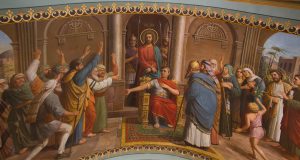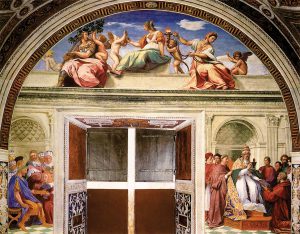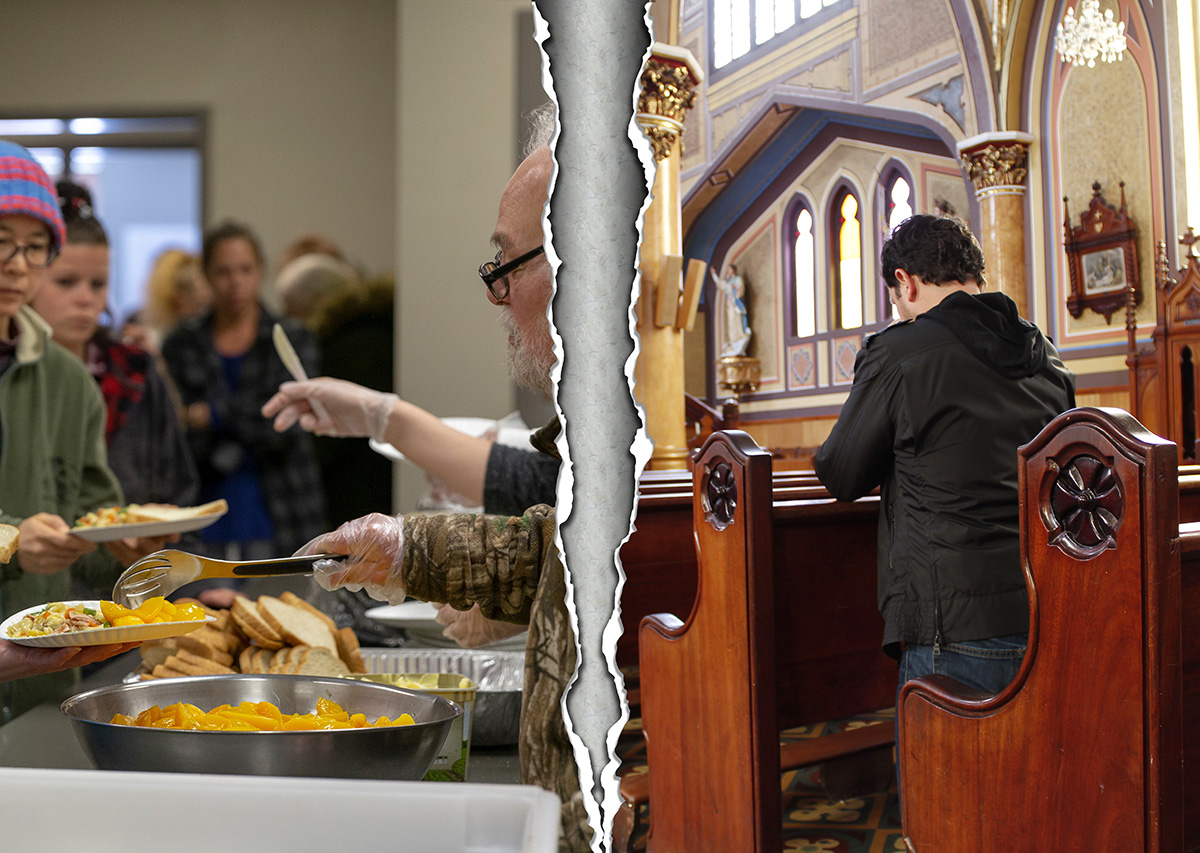
By Wendy Royston
“Faith of itself, if it does not have works, is dead.” (James 2:17)
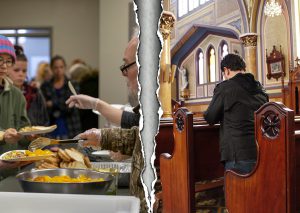 Although the letter of St. James uses this phrase to help us understand the relationship between believing in the love of God and showing it to others, the statement often leaves us even more confused, wondering whether we can—or even if we must—earn the gift of eternal salvation.
Although the letter of St. James uses this phrase to help us understand the relationship between believing in the love of God and showing it to others, the statement often leaves us even more confused, wondering whether we can—or even if we must—earn the gift of eternal salvation.
“Can I work or earn my way into heaven? No, I can’t,” said Father Tom Hartman, pastor of St. Michael Parish in Sioux Falls.
Instead, the passage is intended to reveal the wholeness of Christianity.
“If we’re simply saying that we have this faith, but we aren’t actually modeling ourselves after the Giver—Jesus himself—then, in some ways that faith is worthless,” he said.
The passage from James continues: “Indeed someone may say, ‘You have faith and I have works.’ Demonstrate your faith to me without works, and I will demonstrate my faith to you from my works.” (James 2:18)
“By our very actions, we demonstrate” the love of Christ, Father Hartman said. “If those [works] are not there, do you really have faith? Have you really received the gift?”
Catholics in the Sioux Falls diocese are called to, as Bishop Donald DeGrood has proclaimed, Lifelong Catholic Missionary Discipleship Through God’s Love.
“In the end, what is our reason” for doing good deeds, Father Hartman asked, encouraging that the motive simply be that “we want to be like the Giver. In the end, we want to continue to shape our hearts after the heart of Christ, who healed the sick, who comforted the poor, who consoled the widow or the adulteress—whatever it is, the Lord is really calling us to be the body of Christ.”
Mo Irvine, prison ministry missionary for the diocese, agreed. She referred to a passage from Pope Benedict XVI’s “Deus Caritas Est” to expand on the point:
“Being Christian is not the result of an ethical choice or a lofty idea, but the encounter with an event, a person, which gives life a new horizon and a decisive direction.”
“From this encounter with God, we are faced with a choice: to choose him or to not choose him,” Mo said. “In choosing him, we find ourselves in a relationship with Truth itself, and that changes us…If we choose to live from the truth of who we are and who God is…the personal relationship I have with God will seep into all that I do, and it will inspire me to come outside of myself so that others might experience God’s love and come to know him through their own personal encounter.”
That sort of encounter comes from a place of holiness.
“In some ways, we are called to be sacraments ourselves—we are called to be outward signs that reflect the inward reality of Christ or the invisible grace. When our outward reality and our inward disposition come together in one, we’re kind of this holistic person. This is…truly being a Christian—our faith is this inward reality that takes place, and the outward sign is really our love. There’s a beautifulness in this reality that God is calling us to, that our inward reality—the way in which we draw a picture of that is that way in which our works show,” Father Hartman said. “They’ll know we are Christians by our love.”
Father Hartman acknowledged, too, that some who do not have faith do engage in acts of kindness toward others.
“Paul says, ‘These three remain: faith, hope and love, and the greatest of these is love.’ … When we say, ‘God is love,’ in some ways, we are reflecting the divine by our very acts of love,” he said. “That would give us great hope for people who love but maybe” have not yet come to the realization of God’s presence in their lives. “It should give hope that they have the greatest of the gifts. We should continue to pray for them, that they receive the gift of faith, but also in thanksgiving that we have this person who has such a loving heart.”
A gift to the Giver
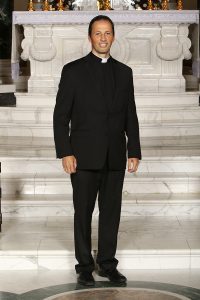
Father Hartman explained that, although heaven is a free gift, we naturally seek to thank God for his divine gift, just as we often seek to repay friends and family for their generosity to us.
“Whenever someone gives you something, you report back to them how much you love it or how much you’ve used it,” Father Hartman said. “In this case, we just want to continue to give God our merits and use that gift in the way that it was intended.”
Just as an earthly gift-giver rejoices in knowing an object they shared with a loved one is being used to enrich that person’s life, God wants us to make the most of the gift he gives, too.
“If my dad were to come in every day and see my laundry hanging on that Soloflex (he bought me), would he be a little disappointed that it’s being used for my dirty laundry?” Father Hartman asked introspectively. “Or what would happen if he saw that I’m using it as it was intended and he sees that I’m working out and getting healthier? When I use a gift as it was intended—how much more it pleases the giver of the gift.”
Father Hartman cautioned that God never takes away his gift of salvation—but that we at times choose to reject it by our actions.
“We are given this great gift of our salvation, and the Lord says, ‘I want you to use this gift for how it was intended,’” Father Hartman explained. “We do believe that, once we’ve been given the gift of salvation, it’s ours to keep, but as a good father, if you give your son a baseball bat and he beats his sister with it. … You’re going to take it away” until the child shows that he is capable of using the bat as it was intended.
“We have to want the gift back and ask for it,” Father Hartman said. “In time of serious sin, the Lord withdraws it to protect it. Of course, that’s when we repent and the Lord says, ‘I’ve just been holding onto this until you are willing to use it as it was intended.’”
As a prison ministry missionary, Mo works with a segment of the population best known by their worst works.
“We are not the sum of our weaknesses and failures; we are the sum of the Father’s love for us and our real capacity to become the image of his Son,’” she said, quoting Pope John Paul II.
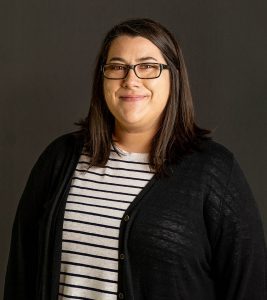
Mo visits the incarcerated, helping them to see the hope of salvation even after serious faltering.
“It seems that many [inmates] know, at least mentally, they are more than what they’ve done,” she said.
Just as with the general population, however, prisoners sometimes struggle to balance the hopes and dreams they’d aspired to with the realities created by their actions and their consequences.
“It takes a strong person to be able to live from who they truly are as sons and daughters of the Father,” she said. “There is a difference … between knowing this truth mentally and believing that you are more than the sum of your weaknesses and failures.”
Since assuming her current role, Mo said she has seen imprisoned men in various stages of faith—some of whom believe God is real but cannot fathom how he can want an intimate relationship with them, and others who have personal relationships with him.
“Conversion is a continual process of detachment from sin and that which leads us away from God,” she said. “I’ve seen guys, while in prison experience peace and freedom from growing in relationship with God, who, once they get out, struggle to live from that same place on the outside, whether it’s a drug addiction, lack of support from other faithful Christians, or simply being overwhelmed by the world.”
Mo cautioned that this struggle does not indicate that the prisoners’ faith was a façade, but rather that we are not intended to make faith journeys alone and keep our faith private.
Opening up about her own faith is a key to the conversion of prisoners, Mo said, but their own births into life with Jesus also strengthen her own relationship with him.
“Sometimes it’s difficult to see our own goodness and that isn’t unique to prison. When I get to see below the surface and encounter who God made them to be, it also renews a great hope in me that I, too, can be transformed if I surrender to God’s will and presence in my life,” she said. “In my entire life, I’ve never met someone who didn’t, at their core, want to be seen, known and loved. In my work, I’m given the space and time with these guys to look beyond the surface. They have allowed me to see the person that God created so intentionally and uniquely and I have the privilege of pointing out that truth and goodness to them.”
One aspect to prison ministry that has surprised her was the inmates’ realization of freedom within prison walls that often leads to organic evangelization.
“I’m not sure what it is that allows some of these men to be open in a unique way, if it’s the environment or a more honest look at one’s own humanity or a greater detachment from material things (even if not by choice), but I see a hunger for truth, a thirst for something that’s real and deep,” Mo said. “They face this tension of how they are currently living versus what they know they need to give up to be a Christian whole-heartedly. When a man chooses to step away from friendships, behaviors, and such that are contrary to the Christian life, people notice. I’ve seen other men start coming to religious activities and engaging in the difficult questions of life because the guy at the end of the tier lives differently—he has a freedom that isn’t easily found in or out of prison.”
Serving in your reality
Father Hartman said all Catholics are called to some form of corporal works of mercy and to openness to smaller ministries.
“To really be able to respond to the grace of the Holy Spirit prompting us, we have to reflect [and ask the] Holy Spirit, ‘Where are you calling me to serve and to do the works of God?…Keep me open to be able to recognize in the moment your calling to serve the people of God.’”
God uniquely calls each person to holiness by giving us a model by which he intends us to use the gift of life and, while offerings of charity and works will not earn heavenly reward, they can merit a higher place in heaven.
“It’s still good to do these works. We aren’t going to earn our way into heaven, but our merits may earn us a higher place in heaven,” Father Hartman said. “Our Blessed Mother, by her charity and works, has earned her place at the right hand of the Father. [In Revelations], we hear that the apostles were all given … thrones in the kingdom of God.”
The Catechism of the Catholic Church (CCC) supports this notion:
“We of ourselves are not able to merit anything, having received everything freely from him. However, God gives us the possibility of acquiring merit through union with the love of Christ, who is the source of our merits before God. The merits for good works, therefore must be attributed in the first place to the grace of God and then to the free will of man.” (CCC 426)
But Father Hartman cautioned that, in order for our works to be attributed to God, we must ensure they are not self-serving, nor actually serving some other “god.”
“‘As for me and my house, we will serve the Lord,’” Father Hartman quoted the book of Joshua. “If you’re married, your primary vocation is that you’re married, (and focused on the needs of) your husband or wife and your children.
“Are we too busy as a family to serve the Lord?…We have to really evaluate: where is our life—what direction is it taking us? Is it really in building up the Kingdom, or are we building up this perpetual cycle of (serving) the ‘sports god’?”
Individuals’ first spiritual obligations come to the family and the work that earns the family a living, and the rest is about balance.
Often, Christians, especially those in the throes of parenthood and professional responsibility, feel their contributions aren’t enough. In those times, Father Hartman encouraged Catholics to keep things in perspective.
Father Hartman shared a memory of his mother, who was at the time actively raising 12 children, telling his grandmother, “I’ve been so busy that I haven’t had time to pray.”
“My grandma would say, ‘Did you pray your morning offering? … Then your whole day becomes a prayer,’” he recalled, reciting the prayer: “I offer to you my prayers, my works, my joys, my sufferings.”
Overall, he suggested keeping perspective.
“I’m called to live from that reality of where God has placed me. The Lord has put us in these places that we are called to act from our reality. I don’t want to under-estimate work, because it is tied to our mission in the moral realm. This is where we are called to serve and to do these acts of charity,” Father Hartman said, challenging each Catholic to introspective prioritization. “Who is more our ‘family’ that we are called to serve? Our parish family—the body of Christ—is really part of our family that needs us to step up and serve the people of God in a particular way,” he said. “In the end, we need to say, ‘How do I serve the body of Christ before I serve’” elsewhere.
Father Hartman pointed out that each Mass ends with a call to the type of mission work Bishop DeGrood desires for the diocese.
“The Mass says to go out, to go forth and serve,” he said. “You’re called to take the gift that you’ve received from the Giver and take it out into the world.”

